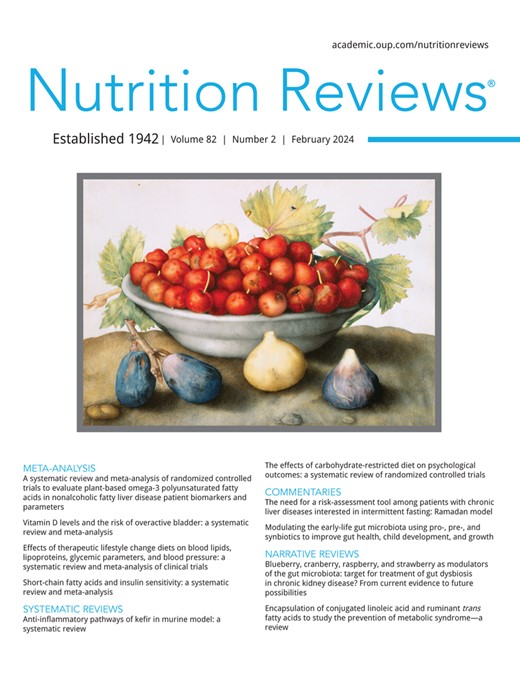不同热量限制模式对血压和其他心血管风险因素的影响:随机试验的系统回顾和网络元分析》。
IF 5.9
2区 医学
Q1 NUTRITION & DIETETICS
引用次数: 0
摘要
目的本研究的目的是通过网络荟萃分析横向比较不同热量限制方法的优缺点,探讨不同热量限制方法对各种心血管风险因素的影响。资料来源检索PubMed、Web of Science、Cochrane Library和Embase文献数据库(2013年10月至2023年10月)。数据提取纳入符合条件的随机对照试验,这些试验涉及接受热量限制的参与者以及收缩压(SBP)、舒张压(DBP)、体重指数(BMI)和高密度脂蛋白(HDL)胆固醇水平的测量。结果隔日禁食(ADF)可降低 SBP(4.88 mmHg;CI,2.06-7.15)和 DBP(5.10 mmHg;CI,2.44-7.76)。限时进食可降低 SBP(2.46 mmHg;CI,0.16-4.76),但不能降低 DBP。结论这项荟萃分析证实了 CER 和 ADF 对各种心血管风险因素的预防作用。此外,CER 更有可能减少肥胖,而 ADF 更有可能降低血压(BP)。根据这项荟萃分析,建议仅对肥胖且无血压升高或其他异常指标的人群使用 CER 控制肥胖。此外,对于血压异常或有其他心血管风险因素的患者,建议使用 ADF 进行早期控制或预防。CRD42023455889。本文章由计算机程序翻译,如有差异,请以英文原文为准。
Effects of Different Caloric Restriction Patterns on Blood Pressure and Other Cardiovascular Risk Factors: A Systematic Review and Network Meta-Analysis of Randomized Trials.
CONTEXT
All types of caloric restriction are preventive against cardiovascular risk factors, but the best restriction method and most affected factors have not been identified.
OBJECTIVE
The objective of this study was to explore the effects of different caloric restriction methods on various cardiovascular risk factors by horizontally comparing program advantages and disadvantages via network meta-analysis.
DATA SOURCES
The PubMed, Web of Science, Cochrane Library, and Embase literature databases were searched (October 2013 to October 2023).
DATA EXTRACTION
Eligible randomized controlled trials involving participants who underwent caloric restriction and systolic blood pressure (SBP), diastolic blood pressure (DBP), body mass index (BMI), and high-density lipoprotein (HDL) cholesterol level measurements were included.
DATA ANALYSIS
Thirty-six of 13 208 records (0.27%) were included. Two researchers reviewed the articles, extracted data, and assessed article quality.
RESULTS
Alternate-day fasting (ADF) reduced SBP (4.88 mmHg; CI, 2.06-7.15) and DBP (5.10 mmHg; CI, 2.44-7.76). Time-restricted eating reduced SBP (2.46 mmHg; CI, 0.16-4.76) but not DBP. Continuous energy restriction (CER) significantly reduced BMI (1.11 kg/m2; CI = 0.16, 2.06) and waist circumference (3.28 cm; CI, 0.62-5.94).
CONCLUSIONS
This meta-analysis confirmed the preventive effect of CER and ADF on various cardiovascular risk factors. Additionally, CER is more likely to reduce obesity, and ADF is more likely to reduce blood pressure (BP). Based on this meta-analysis, CER is recommended to control obesity only for people who are obese and do not have elevated BP or other abnormal indicators. Additionally, ADF for early control or prevention is recommended for patients who have abnormal BP or other cardiovascular risk factors.
SYSTEMATIC REVIEW REGISTRATION
PROSPERO registration no. CRD42023455889.
求助全文
通过发布文献求助,成功后即可免费获取论文全文。
去求助
来源期刊

Nutrition reviews
医学-营养学
CiteScore
12.20
自引率
1.60%
发文量
121
审稿时长
6-12 weeks
期刊介绍:
Nutrition Reviews is a highly cited, monthly, international, peer-reviewed journal that specializes in the publication of authoritative and critical literature reviews on current and emerging topics in nutrition science, food science, clinical nutrition, and nutrition policy. Readers of Nutrition Reviews include nutrition scientists, biomedical researchers, clinical and dietetic practitioners, and advanced students of nutrition.
 求助内容:
求助内容: 应助结果提醒方式:
应助结果提醒方式:


